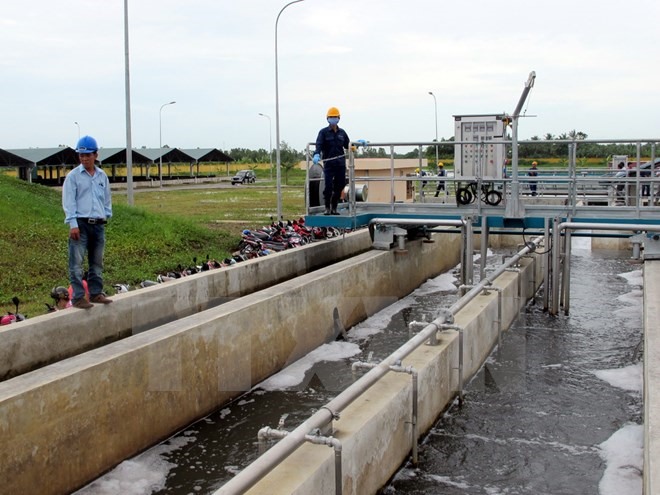 Society
Society

A new technique that helps improve water drainage in urban areas has been proposed by a Japanese company. The technique will help clean underground pipelines without digging them up, saving energy and cost, and can be applied in emergencies.
 |
| A wastewater treatment plant in southern Sóc Trăng City. — VNA/VNS Photo Trung Hiếu |
HÀ NỘI — A new technique that helps improve water drainage in urban areas has been proposed by a Japanese company. The technique will help clean underground pipelines without digging them up, saving energy and cost, and can be applied in emergencies.
The technique has been tested at a number of wastewater treatment plants in Hà Nội and the provinces of Quảng Ninh and Hà Nam. Unlike conventional wastewater treatment techniques, it does not require skilled manpower and has been proven to be effective immediately.
Kobayashi Noboru, director of the Sekisui Việt Nam Pipe Solutions Company, said yesterday that the technique can be applied along with conventional wastewater treatment system in Việt Nam in order to improve the quality of the water drainage system.
Việt Nam is going to be the first country in the world to apply the technique, he said at a conference on solutions for wastewater treatment and improving environment in Việt Nam.
The country had 800 urban areas by the end of last year and the urban population will reach 44 million by 2020 and 52 million by 2025, accounting for 45 and 50 per cent of the total population, according to official forecasts.
These changes require more efficient water supply and water drainage systems. However, there is currently no synchronisation between the systems since they were constructed over different periods of time without coordinated planning.
Some of the sewers have degraded, resulting in insufficient drainage capacity. Most of the wastewater is not treated before discharged.
Statistics from the Ministry of Construction show that there are currently 37 wastewater treatment plants in urban areas with a total capacity of 890,000cu.m per day, treating 12-13 per cent of the total amount of wastewater. One water drainage system is being used for all types of wastewater and rainwater in urban areas.
Several urban areas either have not built or are building domestic wastewater treatment plants. Domestic wastewater is only pretreated in septic tanks before discharged into receiving waters. The percentage of households whose domestic sewers are connected to the water drainage system is extremely low in some areas.
Water drainage is being hindered by sewers that are not wide enough and by the concreting of canals and trenches, leading to urban flooding in HCM City and Hà Nội after heavy rains, and in cities where floods rarely occurred before like Đà Nẵng, Cần Thơ, Quy Nhơn, Hải Phòng, and Nha Trang.
The development of industrial parks results in a major increase in the amount of wastewater. Surface water pollution in rivers, lakes and canals near industrial parks and craft villages – such as the basins of the Nhuệ, Đáy and Đồng Nai rivers – is getting more and more severe, affecting urban water supply.
Reuse of rainwater
A 2014 Government decree on water drainage and wastewater treatment encourages re-use of rainwater in order to reduce floods, saving water resources and reducing exploitation and use of groundwater and surface water sources. It provides preferential loan policies for organisations and individuals offering equipment and technologies for the treatment and re-use of rainwater.
The Ministry of Construction has signed an agreement with Japan’s Ministry of Land, Infrastructure, Transport and Tourism on strengthening the collaboration on wastewater system management between the two ministries.
The Japan International Cooperation Agency (JICA) in Việt Nam is implementing several projects on improving water environment in the urban areas of HCM City, Hà Nội, Quảng Ninh, Hải Phòng, Đà Nẵng, Bình Dương and Huế. — VNS




